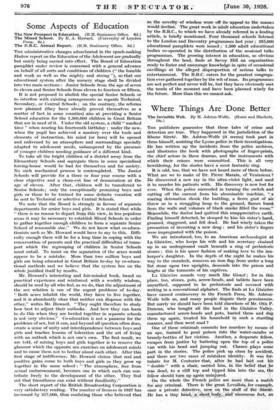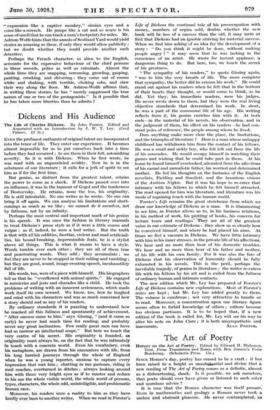Where Things Are Done Better
THE publishers guarantee that these tales of crime and detection are true. They happened in the jurisdiction of the Rhone Sfirete. Mr. Ashton-Wolfe (it seems) took part in them himself, assiating_the Lyons police in their investigation. He has written up the incidents from. the police archiveS, and illustrates the book with photographs of finger-prints, the chief actors in these dramas, and the instruments with which their crimes _were committed. This is all very bewildering, for the stories have a most fantastic ring.
it is odd, too, that we have not heard more of them before. What are we to make of Dr. Pierre Marain, of Venis' sieui? He discovered a new ray in the ultra-violet light, and used it to murder his patients with. His discovery is now lost for ever. When the police succeeded in turning the switch and cutting off the current from his abominable Machine; " roaring detonation shook the building, a fierce gust of air- threw us in a struggling heap to the ground, flames burst from the walls and, volumes of black smoke filled the room." Meanwhile, the doctor had quitted- this unappreciative earth. Finding himself detected, he stooped to kiss his sister's hand, grOaned, staggered, and fell dead. He had wisely taken the precaution of inventing a new drug : and his sister's fingers were impregnated with the poison.
We are introduced, too; to an American archaeologist at La Glaiziere, who keeps his wife and his secretary chained up in an underground vault beneath a ring of prehistoric stones : this is his queer fashion of making love to the inn- keeper's daughter. In the depth of the night he makes his way to the cromlech, removes an iron flap from under a long flat stone upon two uprights, descends into the prison and laughs at the torments of his captives.
La Glaiziere sounds very much like Glozel ; for in this place, too, stones, pots, arrow-heads, and tablets have been unearthed, supposed to be prehistoric and covered with writing in a conventional alphabet. The finds at La Glaiziere
• have caused controversy in the French Press, Mr. Ashton- . Wolfe tells us, and many people dispute their genuineness. But surely we should have been told'ilsewhere of Mr. Otis P. Dithcan, who bought all the land in the Glaiziere Valley, manufactured arrow-heads and pots, buried them and dtig them up again, treated his hciusehold in such a startling manner, and then went mad ?
One of these criminals commits her murders by means of an ape, trained to pour poison into the 'water-carafes or brandy-bottles of her victims. Another, a desperate fellow, escapes from justice by battering open the top of a police van with his head and jumping out. Chance plays some part in the stories. The police pick up clues -by accident, and there are two cases of mistaken identity. It was for- tunate for M. Couturier that, after he had laid out his " double " with a chair, carried him, in the belief that he was dead, to a cliff top and tipped him into the sea, the fellow should, turn upl again uninjured. ,
"On the whole the French police are more than a match for any criminal. There is the great Levallois, for example, once a private detective, now on the staff of the Sfirete. He has a tiny head,:, ar,shoit body and enormous feet, an
" expression like a captive monkey," simian eyes and a voice like a screech. He jumps like a cat and so acute is his sense of smell that he can track a man's footprints for miles. Mr. Ashton-Wolfe hints that the annals of Scotland Yard would yield stories as amazing as these, if only they would allow publicity : but we doubt whether they could provide another such detective.
Perhaps the French character, so alien to the English, accounts for the expressive behaviour of the chief perSons in these records, police as well as criminals. Ahnost the whOle time they are snapping, screaming, growling, gasping, paiiting, croaking, and shivering : they come out of rooms white and shaking, with terrible, choking sobs, and claw their way along the floor. Mr. Ashton-Wolfe affirms that, in writing these stories, he has " merely suppressed the 'true names of one or two of the protagonists." Is it possible that he has taken more liberties than he admits ?









































 Previous page
Previous page